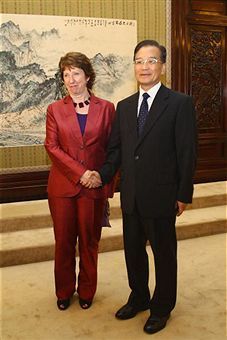 Today’s Times splashed on the spat between Britain and EU foreign policy
“czar” Catherine Ashton over the embargo barring arms sales to China. The embargo was put in place after the Tianamen Square massacre and has remained in place, largely at US insistence,
ever since.
Today’s Times splashed on the spat between Britain and EU foreign policy
“czar” Catherine Ashton over the embargo barring arms sales to China. The embargo was put in place after the Tianamen Square massacre and has remained in place, largely at US insistence,
ever since.
But is it the right policy? The policy has not prevented China from becoming a military power — its annual defense budget officially stands at $70 billion, although the Pentagon believes the real figure to be twice as high. China is developing carrier-killing missiles that even NATO does not have, and will soon sell weapons rather than seek to import them.
There is, of course, a moral argument: the sanctions were put in place because of China’s human rights violations. To lift the embargo before that record improves (China still represses its people) would expose the impotence of the EU’s policy. Also, the European Parliament is also opposed to ending the ban so long as China sells arms to countries like Zimbabwe and Sudan.
There are strategic arguments too. Increasingly, China threatens Taiwan and lays claim to the South China Sea; should the EU sanction an arms build-up that condones China’s contentious policies? For this reason, France seems to have changed its position, now believing the embargo should stay in place.
But the strategic argument can be reversed. China’s Taiwan policy is unlikely to change as a result of the embargo. Besides, is it really the EU’s business? It is hard to imagine Britain and other EU states wanting to fight the Chinese over Taiwan, even if the US does. And the EU needs China these days – investment will help shore-up the euro and a number of European governments. So looking for ways to improve Chino-European links is sensible.
On balance, it makes sense to keep the sanctions in place for now. But Lady Ashton is right to encourage EU states, including Britain, to evaluate their policy regularly and consider what they would be willing to swap for lifting the embargo. Debate is to be welcomed.






Comments